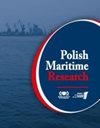Effects of Sway and Roll Excitations on Sloshing Loads in a KC-1 Membrane LNG Tank
IF 2
3区 工程技术
Q2 ENGINEERING, MARINE
引用次数: 0
Abstract
Abstract This study investigates the effects of sway and roll excitations on sloshing liquid loads in a tank, using Ansys Fluent software. The model considered in the study is a 1:50 scaled membrane-type tank, based on a KC-1 membrane LNG tank designed by Korea Gas Corporation (KOGAS). The volume of fluid (VOF) method is used to track the free surface inside the tank, and the standard k-ε model is applied to express the turbulent flow of the liquid. To explore the motion of the tank under excitation, a user-defined function (UDF) and a dynamic mesh technique are employed to control the external forces exerted on the tank through its motion. The results, in the form of time series data on the sloshing pressures in the tank under pure sway, roll, and coupled sway-roll, are analysed, with specific ranges for the excitation amplitudes and frequencies. We show that variations in excitation frequency and amplitude significantly influence the sloshing loads. Sloshing loads are found to intensify when the excitation frequency matches the tank’s primary natural frequency, 1.0 ω1′. Furthermore, with coupled sway-roll excitations, the sloshing loads are weakened when the sway and roll are in-phase and are intensified when these are out-of-phase. Fast Fourier transform analysis provides insights into the frequency domain, showing that the dominant frequency is 0.88 Hz and it is approximately equal to the tank’s primary natural frequency, 1.0 ω1′.摇摆和滚动激振对 KC-1 膜液化天然气储罐中的荡载的影响
摘要 本研究使用 Ansys Fluent 软件研究了摇摆和滚动激振对储罐中倾斜液体载荷的影响。研究中考虑的模型是 1:50 比例的膜式储罐,基于韩国天然气公司 (KOGAS) 设计的 KC-1 膜式液化天然气储罐。采用流体体积(VOF)法跟踪储罐内的自由表面,并使用标准 k-ε 模型来表示液体的湍流。为了探索激振下的罐体运动,采用了用户自定义函数(UDF)和动态网格技术来控制通过罐体运动施加在罐体上的外力。我们以时间序列数据的形式分析了纯摇摆、滚动和摇摆-滚动耦合情况下油箱内的荡压力,并对激励振幅和频率进行了特定范围的分析。结果表明,激振频率和振幅的变化对坍落负荷有很大影响。当激振频率与油箱的主固有频率(1.0 ω1′)相匹配时,荡载会加剧。此外,在摇摆-滚动耦合激励下,当摇摆和滚动同相时,坍落度载荷会减弱,而当摇摆和滚动异相时,坍落度载荷会增强。快速傅立叶变换分析提供了对频域的洞察,显示主频为 0.88 Hz,约等于油箱的主固有频率 1.0 ω1′。
本文章由计算机程序翻译,如有差异,请以英文原文为准。
求助全文
约1分钟内获得全文
求助全文
来源期刊

Polish Maritime Research
工程技术-工程:海洋
CiteScore
3.70
自引率
45.00%
发文量
20
审稿时长
>12 weeks
期刊介绍:
The scope of the journal covers selected issues related to all phases of product lifecycle and corresponding technologies for offshore floating and fixed structures and their components.
All researchers are invited to submit their original papers for peer review and publications related to methods of the design; production and manufacturing; maintenance and operational processes of such technical items as:
all types of vessels and their equipment,
fixed and floating offshore units and their components,
autonomous underwater vehicle (AUV) and remotely operated vehicle (ROV).
We welcome submissions from these fields in the following technical topics:
ship hydrodynamics: buoyancy and stability; ship resistance and propulsion, etc.,
structural integrity of ship and offshore unit structures: materials; welding; fatigue and fracture, etc.,
marine equipment: ship and offshore unit power plants: overboarding equipment; etc.
 求助内容:
求助内容: 应助结果提醒方式:
应助结果提醒方式:


